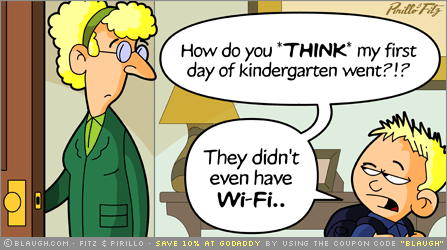Marc Prensky coined the term “digital native” and “digital immigrant” in a 2001 piece called, “Digital Natives, Digital Immigrants” from On the Horizon (MCB University Press, Vol. 9 No. 5, October 2001)
Prensky felt Net Gen or the Digital Gen were better named, “Digital Natives.” Prensky says, “Our students today are all “native” of the digital language of computers, speakers video games and the Internet.” He defines the “rest of us” as “Digital Immigrants”. “Those of us who were not born into the digital world but have, at some later point in our lives, become fascinated by and adopted many or most aspects of the new technology.” Prensky says Digital Immigrants learn – “like all immigrants, some better than others – to adapt to their environment.” But, he contents, Digital Immigrants never lose the “accent.” He even suggests they socialize and learn different.
The “accent” of the Digital Immigrant is described by Prensky with simplistic illustrations. He says there are “hundred’s of examples of the digital immigrant accent.” He suggests that printing out your email or printing a document to edit instead of editing it on the computer gives away your immigrant status. His examples get more degrading and state that this is not a joke. He says the difference between Digital Immigrant instructors using “outdated language (that of the pre-digital age), ” and the native digital speakers as “the single biggest problem facing education today.” Really – the single biggest problem facing education?
illustrations. He says there are “hundred’s of examples of the digital immigrant accent.” He suggests that printing out your email or printing a document to edit instead of editing it on the computer gives away your immigrant status. His examples get more degrading and state that this is not a joke. He says the difference between Digital Immigrant instructors using “outdated language (that of the pre-digital age), ” and the native digital speakers as “the single biggest problem facing education today.” Really – the single biggest problem facing education?
I am wondering while reading Prensky’s decade old ideas if I am not reading marketing instead of academic ideas. Is Prensky selling his ideas and merchandising his products? Academics and professional writers used and passed on these labels since 2001, but recently there has been an uprising. Challenges to Marc Prensky’s terms questions the terminology. Prensky describes himself as “an innovator in the areas of education and learning and founder of Games2train, an e-learning company. “The Myth of the “Digital Native”Why Generational Stereotyping Won’t Improve Student Learning Prensky has several master’s degrees from Yale, Middlebury, and the Harvard Business School. Again from his own website, “Prensky is considered one of the worlds’ leading experts on the connection between games and learning.” Prensky is known for combining education tools with game tech.
 The innovator is challenged by Fred Mindlin in his article, “The Myth of the ‘Digital Native’ Why Generational Stereotyping Won’t Improve Student Learning” declared that babies of the digital age were not born using the Internet. Mindlin says:
The innovator is challenged by Fred Mindlin in his article, “The Myth of the ‘Digital Native’ Why Generational Stereotyping Won’t Improve Student Learning” declared that babies of the digital age were not born using the Internet. Mindlin says:
On the contrary, my experience working with students K-12 is that most have a limited understanding of the Internet’s power and potential and lack the critical and analytic skills to harness it for their own uses. In terms of the Internet, I am the native, present since it was browsed with the original Netscape dragon.
So, who is Marc Prensky? As an expert gamer/educator is he an immigrant or a native? Does it matter?


